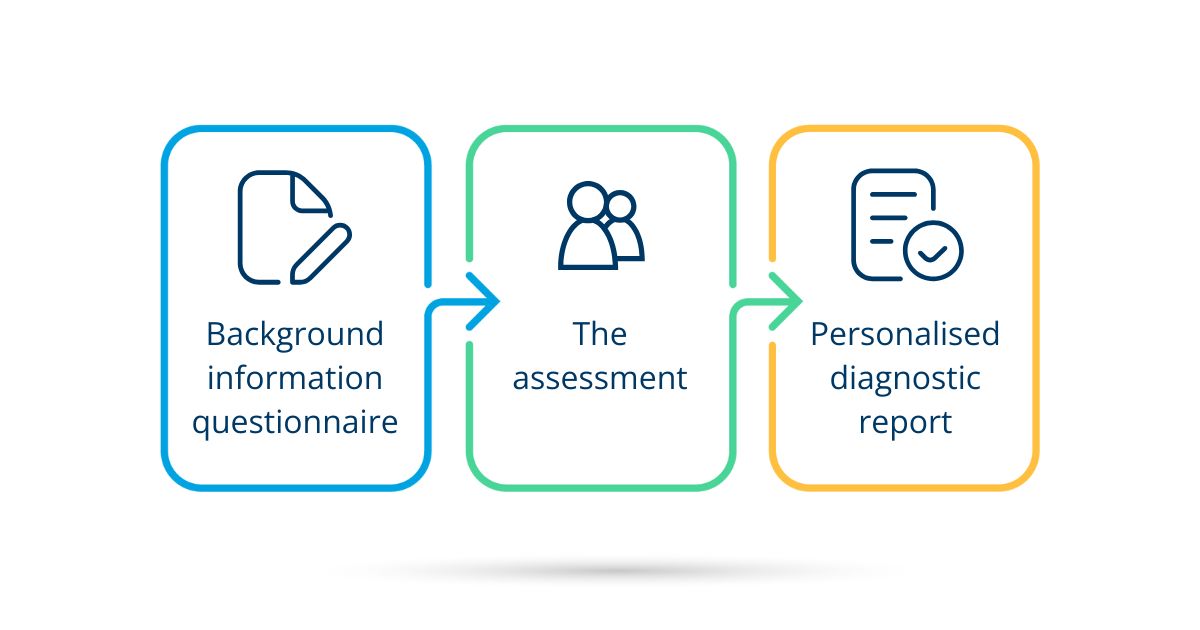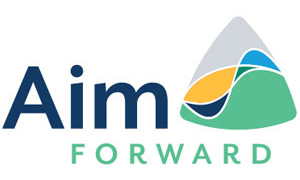When it comes to understanding individual needs, the difference between a needs assessment and a diagnostic assessment can make all the difference in finding the right support. While both aim to help uncover the challenges you or someone may be facing, each serves a unique purpose. Whether you’re looking for yourself or are a parent, educator, or professional, knowing how these assessments differ can guide you in providing the right care and resources. Let’s explore what sets them apart and how they can work together to empower individuals
What is a diagnostic assessment?
A diagnostic assessment for specific learning difficulties (SpLDs) is a formal assessment by a qualified assessor trained to identify SpLDs, including dyslexia, ADHD and dyspraxia. At Aim Forward, all our diagnostic assessments are performed by educational psychologists who are registered with HCPC, or specialist assessors with an Assessment Practicing Certificate.
The process follows the below:

The diagnostic assessment starts with a background information questionnaire. This provides the assessor with information about your educational background, medical history and any previous assessments.
During the assessment with Aim Forward, you will be asked to complete several tasks. These are not pass-or-fail tests – they are designed to highlight indicators of a specific learning difficulty (SpLD), your cognitive profile, as well as your strengths and weaknesses. The following areas will be explored:
- Language and practical tasks
- Memory
- How long it takes you to process information
- Reading ability
- Writing and spelling skills
The diagnostic assessment is followed by a personalised diagnostic report which contains:
- A diagnostic decision
- Your cognitive profile
- Information on your strengths and weaknesses
- Recommended sources of additional information or support
Aim Forward only delivers diagnostic assessments for specific learning difficulties, however there are other diagnosis pathways for different types of neurodivergence. This includes autism, a psychiatrist diagnosis of ADHD to access to prescription medication, developmental coordination disorder, and Tourette’s syndrome.
Who can have a diagnostic assessment?
Aim Forward diagnostic assessments are for anyone who wants or needs a diagnosis of a specific learning difficulty, and thinks they may have dyslexia, ADHD or dyspraxia.
Some people feel they benefit from having specific terms for their experiences, and others need a diagnosis to access support like Access to Work, exam arrangements, Disabled Students’ Allowance or reasonable adjustments.
Aim Forward can offer diagnostic assessments for:
- Adults and young people aged 14+ with specific learning difficulties with traits of dyslexia
- Adults and young people aged 16+ with specific learning difficulties with traits of ADHD or dyspraxia.
What is a needs assessment?
In simple terms, the needs assessment is where the ‘so what?’ question is answered.
So what does my diagnosis mean?
For many people the diagnostic assessment comes with a very thorough 20-30 page report, but what does it mean? Whilst some people find it helpful to have so much information and insight into their cognitive profile, others only read the line or paragraph that states the diagnosis.
A needs assessment can help to bring your diagnosis to life. What is going on for you personally, and how does this impact you daily? For example, why do you struggle with procrastination, time management or communication issues?


So what should I do differently?
For many people, a diagnostic assessment brings clarity and validation. It can give you the freedom to accept yourself as you are. But what should you be doing differently on a day-to-day basis? How do you make your diagnosis work for you? We know there are strengths associated with neurodivergence, but sometimes the challenges can feel like mountains to climb.
A needs assessment can help equip you with practical solutions and strategies to help manage the barriers and things you find most difficult.
We believe that by answering the ‘so what?’ question, you can feel empowered and equipped with the tools to learn and work in a way that best serves you.
Who can have a needs assessment?
Our needs assessments are for adults and young people aged 14+, who know they work and learn differently. We can provide them with the support they need to help them excel.
Whilst a diagnostic assessment is often where many people start their journey with us, those who don’t feel they want or need a label can choose to start with a needs assessment.
Our needs assessors hold a variety of disability-specific qualifications, alongside decades of experience working with neurodivergence, mental health conditions, and other disabilities including lived experience. This puts us in a unique position to provide needs assessments that recognise co-occurring conditions (where you experience more than one condition at the same time).
Over 20% of our needs assessment clients have two or more formally diagnosed conditions, but many more experience undiagnosed traits or symptoms. For example, you may have a diagnosis of ADHD, but also be experiencing symptoms of anxiety and depression. Our needs assessments focus solely on you and your unique needs.
What you can expect to cover in a needs assessment
Your needs assessment is conducted over a video call as an informal two-way conversation between you and your assessor (no tests, we promise!) You can choose to have someone attend the needs assessment with you. This can be helpful if parents can add insight into the way you are learning and working.
The assessment will help you find strategies for learning and working your way, and each session is unique depending on your needs our assessor will guide you to explore areas such as:
1. How your diagnosis impacts your:
-
- reading and research
- writing and composition
- meetings
- presentation and note-taking
- time-management and organisation
- revision and exam preparation
- environment
- wellbeing
2. Key aspects of your cognitive profile, which could include:
-
- verbal and visual ability
- working memory
- phonological awareness
- processing speed
- attention and concentration
- social and communication skills
- planning and organisational ability
3. Assistive technologies that you feel could work for you, and could include:
-
- well-being and mental health software and apps
- text-to-speech software
- speech-to-text software
- mind mapping software
- grammar checkers
- note-taking software and apps
What happens when you contact us about a needs assessment?
Here is a step by step guide:

1. Contact us
- We can answer any questions you may have – let us know if you prefer to speak on the phone or e-mail. We’re here to help.
2. Booking
- We will guide you through the booking process. We’ll find a date and time that works for you.
- We will send you everything you need for the assessment, including a pre-assessment form we ask you to complete in advance
3. Pre-Assessment information
- You complete the pre-assessment form. This asks you for information such as:
- Your diagnosis (or suspected diagnosis)
- What strengths and challenges you face as a result of your diagnosis
- What has worked and not worked in the past
- Any expectations for what you’d like to cover in the needs assessment.
- You send us any previous diagnostic reports or medical information that would be useful for your assessor to know in advance of the assessment
- Many people find it helpful to complete the pre-assessment form with the help of someone who knows them well (a colleague, friend, partner or parent for example). Our support team is also on hand to help if you have any questions at all.
4. Your assessment
- Your needs assessment is conducted over video call as an informal two-way conversation between yourself and your assessor. No tests, we promise!
5. Your report
- Your assessor will send you a report, which includes personalised strategies for working and learning your way, as well as any assistive technology recommendations they think will be helpful. Some people choose to keep this report for their personal use, and others share it with anyone who could make reasonable adjustments to support you like an employer, clients, your school, college or university.
- If you would like any changes making to the report before you are happy to share it with others then please let us know. We want you to be happy with it.
6. Follow up
- We follow up with you 2 months after the assessment to find out how you’re getting on and see if you’d like any other support. We can offer coaching or consultations to help support you embedding your strategies.
Why are needs assessments important?
We often hear from our clients that our needs assessment is the first time that someone has truly listened to what it’s like to live in their world, and how their neurodivergence impacts their daily lives. A conversation with an expert where you feel heard and understood can be liberating. Needs assessments are an opportunity to explore and overcome whatever barriers or frustrations you face.
Everyone faces different struggles, whether it’s issues with procrastination, concentration or communication. The knowledge that you can find solutions and strategies to overcome your barriers can be a weight off your mind.
Needs assessments help you to validate everything you experience, what you’ve been through, and what you’ve achieved. Many people already have strategies in place that they don’t give themselves credit for. One of the main benefits of a needs assessment is that it can help you be kinder to yourself.
Conclusion
At Aim Forward, we believe that needs assessments aren’t given enough attention or credit. Our needs assessors take immense joy and satisfaction in helping you reach your potential. It’s no wonder over 94% of our clients would recommend a needs assessment to a friend or colleague.
Read more about our clients who have benefited from a needs assessment.
If you’re looking to find solutions to shape your future get in touch to book a needs assessment today

